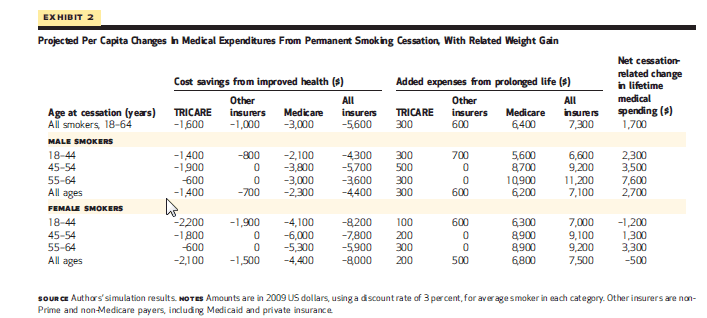A new paper in Health Affairs estimates the impact of smoking cessation on future health care costs among persons covered by TRICARE, taking account of changes in life expectancy.
The last column on the right shows the net impact by gender accounting for the expected increase in weight gain that is associated with cessation (slight reduction in lifetime medical costs for younger women; slight increase for men). The focus of the analysis is health care costs paid by third party insurers and you can follow the calculus of the cross subsidies above (lower costs while alive, higher costs from living longer,with the net depending on gender and age at cessation).
This table focuses only on part of the external cost of smoking (that cost that might be shifted outside of the household). The social, or total cost of smoking includes external costs, but also private ones and quasi-external costs that accrue within the household. I explored a complete assessment of the social cost of smoking (private, quasi-external and external costs) with colleagues in The Price of Smoking (MIT Press, 2004).
In $2000 we found that the cost of a pack of cigarettes was around $40/pack, but that most of the cost was borne by smokers (private cost ~$33/pack) and family members (quasi-external cost ~$5.50/pack) via shortened life span. The purely external costs (including flows like those above, but accounting for many other sources of potential cross subsidy like Social Security and private life insurance) were around $1.50/pack net of excise taxes. The new paper is a nice analysis, but focuses only on one aspect of the true, or societal cost of smoking and in doing so likely greatly underestimates the benefits of cessation.
**
Wenya Yang, Timothy M. Dall, Yiduo Zhang, Shiping Zhang, David R. Arday, Patricia, W. Dorn and Anjali Jain. Simulation Of Quitting Smoking In The Military Shows Higher Lifetime Medical Spending More Than Offset By Productivity Gains. Health Affairs, 31, no.12 (2012):2717-2726.
cross posted at freeforall

The framework is a little odd. The ex-smokers live longer and therefore have additional medical costs in those extra years. But they are probably enjoying the time, and producing and paying taxes. Either you should go the whole hog and place a monetary value on quality-adjusted life years, or just cut it back to mean annual costs.
I would note that one additional cost of longer life is the change in mix of health and functionality issues. If my memory is correct, smakers are very much less likely to die with substantial cognitive impairment (basically, smokers die before age-based cognitive impairment becomes significant)-although nursing home care is not covered by Medicare, that is a substantial additional cost.
Sam, I wouldn’t necessarily conclude that this is the case. Smokers do not live as long on average, but smoking is itself a factor in cognitive impairment as it inteferes with respiratory and circulatory health (blood flow, oxygen saturation levels), so a smoker might be more likely to spend whatever “out years” he does have in a more acute state of cognitive impairment as a result of diminished blood flow and oxygen delivery to the brain. I don’t know that this is obviously the case, but it wouldn’t surprise me because the negative effects of smoking are profound, even when they aren’t acutely lethal in the form of lung cancer.
You may be right-I’m trying to remember a presentation from a professional meeting on cognitive impairment as related to LTC costs, which is not my professional specialty.
Here are some examples of research that shows the link between smoking and dementia:
http://www.healthiertalk.com/smoking-and-dementia-connection-3054
http://www.huffingtonpost.co.uk/2012/02/07/male-smokers-higher-risk-dementia_n_1259305.html
These are summaries, not the actual research papers. So basically, from a cost perspective, you would be looking at whether the “early death” facctor offsets the “more likely to be demented at time of death” factor. The studies also noted that decline among smokers occurred earlier, so the “total number of years being demented” might not be quite as different for smokers notwithstanding earlier death. Happy thoughts, no?